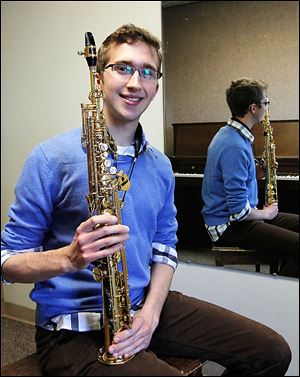
Hearing loss doesn’t stop saxophonist from his dreams
BGSU graduation day awaits senior on Friday
5/2/2013
Jacob Kopcienski, who was fitted for his first hearing aids between ages 4 and 5, will graduate Friday as a music major at Bowling Green State University. Mr. Kopcienski, a 21-year-old saxophonist, said he’s more focused on what he can’t do as a musician as opposed to what he can’t hear.
BOWLING GREEN — Saxophonist Jacob Kopcienski’s journey to graduation differed from classmates at Bowling Green State University’s college of musical arts in one notable way.
Like them, he honed his technique in Moore Musical Arts Center practice rooms. He played in marching and concert bands, wind ensemble, and smaller groups. He studied abroad and completed his music education major.
He made friends, memories, music.
But for every rehearsal and performance, for each conversation with a classmate or consultation with a professor, he had two constant companions. A pair of nearly invisible hearing aids accompany the music student almost everywhere.
“Everyone’s slightly different, and everyone has their own little challenges. And it’s just how ... you perceive them makes a big difference in terms of how you approach them,” said Mr. Kopcienski. “If I have something that I want to do, I’m going to find a way to do it.”
The 21-year-old senior from Rochester, N.Y., graduates Friday. He’s among thousands of area college students who will celebrate the academic achievement this weekend. BGSU’s commencement ceremonies take place Friday and Saturday; the University of Toledo’s main ceremonies are Sunday.
Mr. Kopcienski was fitted for his first hearing aids between ages 4 and 5. He doesn’t remember the early audiologist visits, but said his parents had his hearing checked after he didn’t respond to some interactions. The condition could be genetic — his sister also is hearing impaired — or perhaps related to ear infections.
In fourth grade, he picked up the saxophone, and in music he found a passion and pursuit that combined intellectual and technical rigor with expressive possibilities. By fifth grade, according to a letter he wrote to himself as a youngster, he had decided to be a band director or teacher.
Mr. Kopcienski mentioned in a university admission essay his moderate to severe sensorineural hearing loss in both ears, but it didn’t affect the audition process.
It’s not that his hearing loss isn’t a factor, a consideration, an occasional frustration requiring him to sometimes ask a person to repeat himself or struggle to discern similar sounding words. But it isn’t who he is.
“I’d rather people view me as Jake the musician, Jake the person, Jake the whatever — rather than Jake the hard-of-hearing person,” he said, adding he feels lucky to have the resources so that hearing loss doesn’t have to define his life.
With the push of a button he can change his hearing aids to one of three programs customized to enhance hearing in different situations. A general-purpose program helps him hear sounds from all around. Another is useful in conversational settings, and he chooses a third program for performing.
He stashes the hearing aids in his backpack when it rains. He keeps hearing aid batteries in his instrument case, just in case. During one performance, he forgot to put in fresh batteries and was reminded by the beeping that warns of impending power loss.
During a face-to-face interview, Mr. Kopcienski didn’t miss a beat. Confident but not conceited, he acknowledged the extra work required to accomplish tasks others may take for granted.
“I’m sure there are things that I don’t even think about that other people would look at and say, ‘Wow ... that must have been really tough,’ but since it’s just sort of, you know, what I have to live with, it’s not something that I even really think about,” he said. “I think more about ... what I can’t do as a musician rather than what I can’t do because I can’t hear.”
As a student-teacher at Perrysburg High School, Mr. Kopcienski told the students he worked with that hearing can be challenging. They, in turn, were respectful and responsive.
His hearing loss hasn’t deterred his own music lessons, said John Sampen, a BGSU professor and saxophonist. He taught Mr. Kopcienski since freshman year and described the young musician as intense, intelligent, and curious.
“I was really struck by the fact that it didn’t seem to bother him or impact him in a negative way on his work as a student or a musician. It was just part of his life,” Mr. Sampen said. “He’s very serious. He’s thinking forward in his life, and where he wants to be, and how he can find that right niche for himself.”
On one of his last days before graduation, Mr. Kopcienski sat at a picnic table amid a bustling campus. The music center buzzed with activity. Sound, all around: Heels clicked down a hallway, students chatted. Outside a bird trilled, a tuba bellowed.
He has no way to judge how his perception of sound differs from others. And since he can’t change how he hears, he’s determined not to dwell on how life may have been different if he were not hearing-impaired.
What he does have control over are his next steps — as his professor can attest, he’s a planner.
In the coming months, he will keep a strict practice schedule to prepare for a September audition at a conservatory in Paris, where he hopes to study under saxophonist Jean-Michel Goury. Mr. Kopcienski ultimately wants to earn a doctorate and work as a university-level studio teacher.
“I’ve got a very, very outstanding class of saxophonists, and he’s one of the top ones,” Mr. Sampen said.
Contact Vanessa McCray at: vmccray@theblade.com or 419-724-6065.